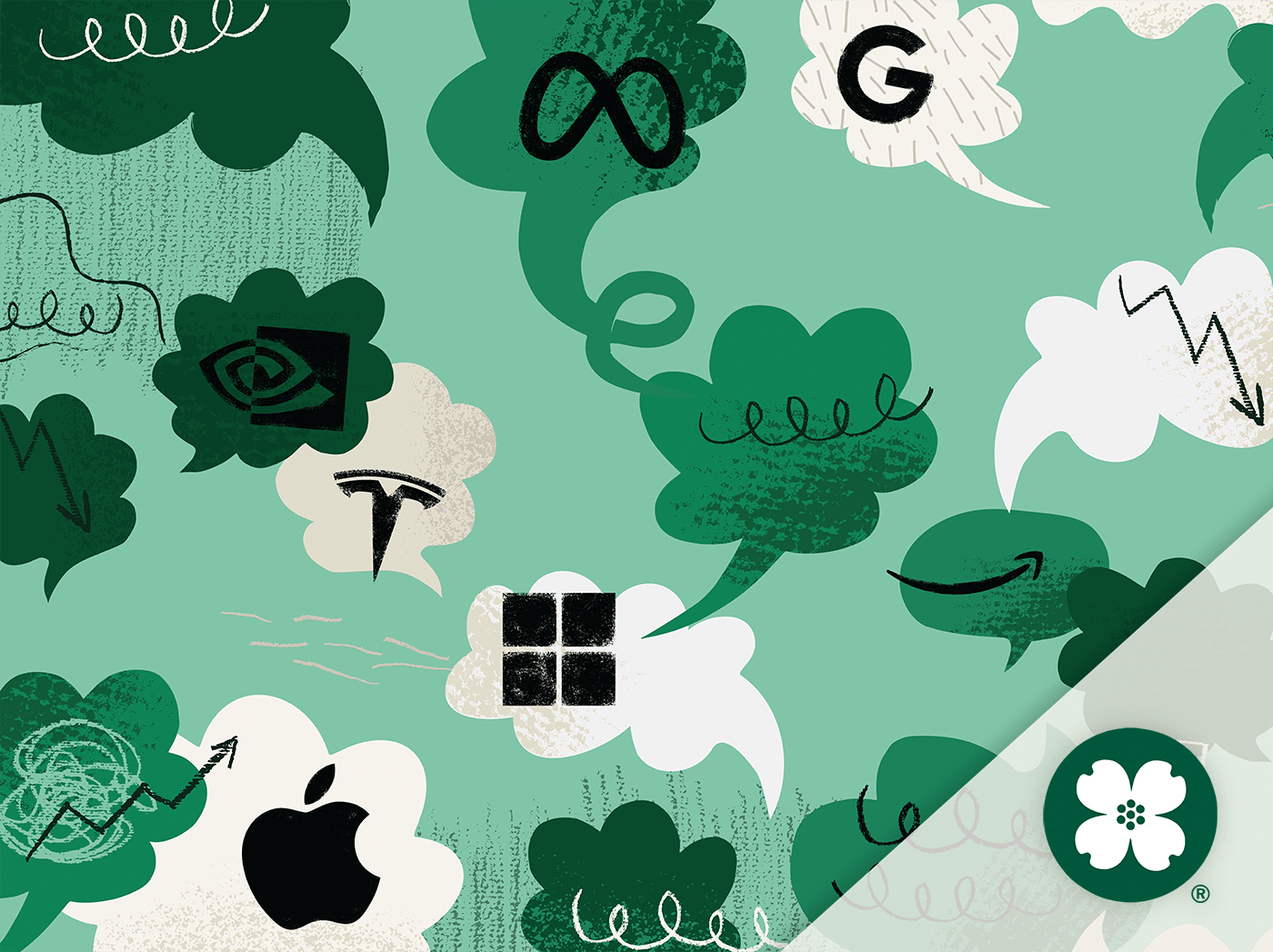Markets heated up in January as stocks, global equities, and precious metals rallied while AI spending, Federal Reserve uncertainty, and volatility raised caution.

By Jason Flores, CFA, CAIA – Executive Vice President & Chief Investment Officer
The Hidden Risks Facing Market-Leading Companies
The Magnificent Seven last year and the Fab Five this year have been discussed extensively in investing circles. We have noted the risk to the overall market of having investment performance dominated by just a handful of companies. Although the risk to the market of extreme concentration has been noted and discussed extensively, there are comparably fewer articles or discussions about the risks to these companies themselves. It is inherent that if there is a risk to the market by being concentrated, that must mean that there are risks to the companies that are causing the concentration. But what are these risks, particularly for the companies that have been leading the market to all-time highs over the past few years?
Some risks affect every equity security to some degree, such as general economic conditions, including inflation, interest rate movements, consumer spending, trade policy, and currency movements. Also, market conditions such as overall sentiment, investment flows, trading volumes, and liquidity. There are always company-specific risks, such as the product or service losing steam, mismanagement, new competitors, and poor capital allocation. The political and regulatory environment can affect companies and industries as well. Every company has one poor marketing campaign or one social media post away from alienating its core customers. However, when looking specifically at Microsoft, Apple, Nvidia, Google, Meta, Amazon, and Tesla, what are the risks to these companies?
Each of these companies have risks that are specific to their core businesses, but the biggest risk may be each other.
Artificial Intelligence (AI) is the New Arms Race
The Magnificent Seven are all chasing AI. For some of these companies, AI has been a boon and a natural fit. Nvidia’s semiconductors are the poster child for AI. In fact, it seems almost preposterous to think that Nvidia will not win as AI continues to advance. However, the innovation in the chip space needs to be funded, and funding comes from selling semiconductors. Nvidia has seen revenue increase from $16.68 billion in the 12 months ending 1/31/21 to $60.92 billion in the 12 months ending 1/31/24, according to Yahoo Finance.
As the cost of chips has gone up, major buyers have started looking into ways to produce chips themselves. Apple, Google, and Meta have been working on their own semiconductors. All three companies may still be reliant on Nvidia’s graphics processing units for some time. Microsoft, Amazon, and Tesla are expanding relationships with Nvidia, even as Microsoft is in development of a new network card to reduce dependence on Nvidia. Additionally, Telsa has plans to build a supercomputer to rival Nvidia.
It may be that these plans are just plans. These companies might find out that the semiconductor business is not for them, but it is worth noting that the big companies are looking to reduce costs and bring the semiconductor race for AI in-house.
Digital Advertising Is the Lifeblood For Many Companies
Meta generated over $130 billion in 2023 from ad revenue, according to Statista. However, Meta has been reliant on platforms from Google, Apple, and Microsoft to gain this revenue. Apple’s move to provide iPhone users with more security, and Meta with less ability to track and use user data was the first shot across the digital advertising bow.
Next came Google’s announcement that it is making significant changes to cookies, slated to be fully implemented in the back half of 2024. This change will further hamper Meta, and other digital advertisers from accessing user data and creating custom ads. The situation here is fluid, but suffice to say, platforms are getting more restrictive regarding user data, leaving those without a platform out in the cold.
Apple and Google’s Smart Phone Race
Google is clearly ahead in number of users and brands that utilize the Android operating system. It is now considered the default smartphone system. However, Apple’s brand loyalty and appeal to higher-end consumers leads to higher revenue and margins.
Google, Microsoft, and Apple: A Battle of OS and Browsers
Much like the domination Google exhibits in smartphones, it also dominates in web browsing, with Chrome capturing 65% of the global browser market share compared to 18% and 5% for Apple’s Safari and Microsoft’s Edge, respectively, as of April 2024 (data provided by Global Stats).
Cloud Computing is a Battleground for Tech Giants
Amazon, Microsoft, and Google have been battling for dominance in this space for years now. Amazon’s Web Service, Microsoft’s Azure, and Google Cloud retain the top three positions in cloud computing with 31%, 25%, and 11% overall market share as of Q1 2024, based on data from Statista. Each of these cloud computing services offers a different experience, such as Azure being a better enterprise solution, while AWS is a better infrastructure solution. But make no mistake, all three are in serious competition for the cloud.
Meta and Apple Battle for Dominance in Virtual Reality and the Metaverse
Mark Zuckerberg literally changed the company name to reflect his commitment to alternate reality, but that didn’t stop Apple from releasing the Vision Pro to compete with Meta’s Quest 3 headset. Although Meta is currently ahead of Apple in users and development, don’t expect Apple to stay far behind. Apple’s ability to seamlessly integrate its devices and operating systems appears to be sought out by users. This may be the reason why Meta is rushing to offer its platform to developers, seemingly taking a cue from Google’s Android operating system.
All these companies have massive cashflows, are highly profitable, and are some of the best companies in the world. But even the biggest face challenges, in this case, each other. The heating up of the AI race is the latest chapter, and likely the most expensive area for each of these companies to compete, ChatGPT, Gemini, CoPilot, Bard, all these tools are incredibly expensive, and not yet profitable.
Meta noted on their recent earning call that they would be devoting $35 to $40 billion to AI development this year. Google will spend over $100 billion on AI according to its AI division CEO. Apple has spent over $100 billion in the last five years on AI initiatives. Tesla will spend about $10 billion on AI initiatives this year as well.
A billion here and a billion there, and suddenly, the most considerable risk in these companies may be each other.


